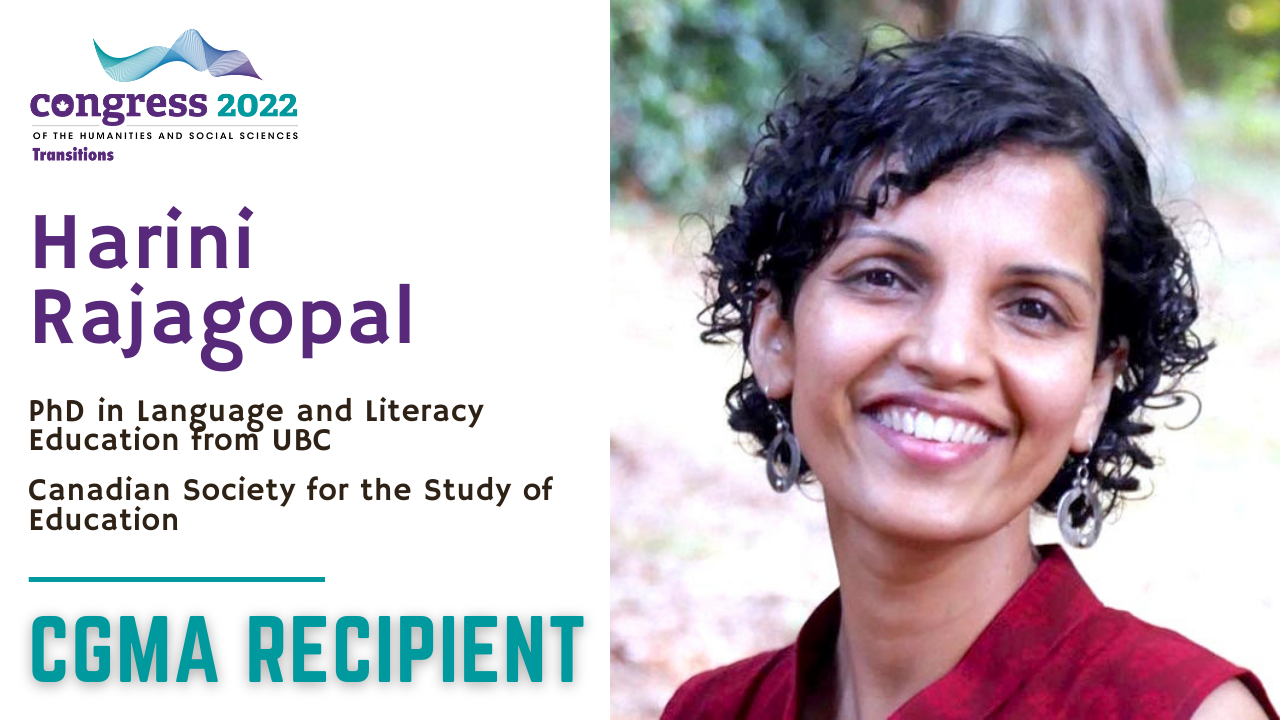Nominated by member scholarly associations of the Federation for the Humanities and Social Sciences, the 2022 Congress Graduate Merit Awards recognize exceptional graduate students who will be presenting their work at the Congress of the Humanities and Social Sciences.

Tell us about yourself.
Harini Rajagopal recently completed her PhD in Language and Literacy Education from UBC. Her research interests include languages and literacies in the early and elementary years, multiliteracies, equitable translanguaging, critical literacies, childhood studies, and teacher education. She enjoys listening to stories to create collaborative and creative pedagogical designs with teachers and children.
List the scholarly association(s) of which you are currently a member.
- LLRC
- CATE
- CAREC
- AERA
- CSA
At which conference(s) will you be presenting and/or attending?
Hoping to attend many!
Presenting at Canadian Society for the Study of Education (CSSE) - CATE, CAREC and the Canadian Sociological Association (CSA)
What is the title of your Congress 2022 presentation?
-
Listening to stories: Collaborating with children and their teacher to explore the communicative repertoires of young emergent bilinguals.
-
Playful subversion by young emergent bilinguals: agentive multilingual, multimodal experiences in an elementary classroom space
How would you describe the research you will be presenting at Congress 2022?
-
I collaborated with students in a Grade 2/3 classroom and their teacher for a year to understand how children’s home languages and literacies can support their school learning. Particularly, I interacted with the children who were categorized as English learners – who can be emerging as bilinguals – and designed practices with the class to welcome their languages and capacities in drawing and photography. I found that when collaborative processes, various languages, and creative ways of making meaning were intentionally included in the classroom, these emergent bilinguals found resourceful ways to display their learning and identities. However, these processes were impacted by class and cultural inequalities that marginalized students frequently experience. By designing inclusive pedagogies, the study connects diverse ways of meaning making, highlights the importance of relationships, and the identities of competence that emerge through children’s stories.
-
This presentation invites conversation about the use of multiple languages in elementary classrooms and seeks to dispel deficit perspectives of emergent bilinguals - often labelled English Language learners. I share two examples from my dissertation in a Grade 2/3 classroom that highlight how children used “playful talk” to resist systemic issues related to inclusion of multiple languages. Negotiating issues of accent, appropriateness, and normative discourses, these children navigated ways to include their languages and identities within the English-only world of the classroom. I discuss these as “playful subversions” since multilingualism is structurally unsupported and English learning comes at the expense of their home languages ideologically and pedagogically. I also pay attention to how this welcoming of languages enhanced students’ multimodal meaning making, learning, and belonging within the classroom.
How does the research you will be presenting connect with the Congress 2022 theme, Transitions?
Ladson-Billings (2021) has discussed how the notion of four pandemics – the COVID-19 pandemic, the pandemic of systemic racism, the economic crisis, and the climate crisis – together expose the long-standing and deep disparities in our systems. Many children and families locally and globally are living with increased stress and trauma related to each of these aspects. Reports have identified the education inequalities and the idea of a shadow pandemic referring to learning loss from disrupted schooling for those who were already left behind being further left behind. This is indeed a time of transitions.
This period of transition and these challenges call for new ways of understanding and building systems that embrace equity and justice. Acknowledging challenges and transitioning to an integrated approach to learning that encompasses all experiences, values, languages, and cultures offers one way to a more radically just educational experience.
We can consider this transition as a space and an opportunity to re-frame and re-set educational systems – my work listens and creates within this space.
What is your favourite part of the Congress experience?
Learning along so many scholars and researchers, exploring new ideas, and making connections.
Share your hopes for Congress 2022.
I am hopeful that Congress 2022 will offer an approach of revitalization and integration related to education, knowledge, and literacies and a focus on achievements of community and culture and relational ways of living and learning together.
